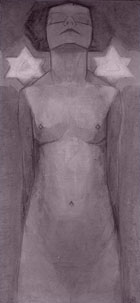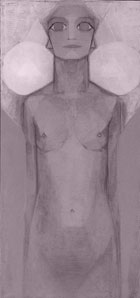
A Voyage to Arcturus is often interpreted as presenting various philosophies through the ways of life of the inhabitants of Tormance, only to have them revealed as a sham by the appearance of the “Crystalman grin”.
C S Lewis sums up this view:
“In each chapter we think we have found his final position; each time we are utterly mistaken. He builds whole worlds of imagery and passion, any one of which would have served another writer for a whole book, only to pull each of them to pieces and pour scorn on it.”
— C S Lewis, “On Stories”, in On Stories and Other Essays on Literature, p. 11
The principles Lindsay rejects could be read as follows:
| Sequence | Rejects... |
| Séance | Social life and shallow spirituality |
| Joiwind & Panawe | Lovingkindness for all living creatures/self-sacrifice |
| Oceaxe & Ifdawn Marest | Will-to-Power struggle |
| Spadevil & Sant | Dedication to duty |
| Swaylone’s Isle | Art as a way to truth |
| Threal | Religion as a way to truth |
| Sullenbode | Sex/sexual love |
| Gangnet | Mysticism and self-abnegation |
But not all episodes end with the Crystalman grin, nor even a direct rejection. Joiwind and Panawe, for example, are merely left because Maskull feels the need to explore; neither dies nor is “disproved”. (And Maskull obviously still values Joiwind, though in a rather twisted way, as, later in the book, he kills her brother rather than risk his now-sordid story getting back to her.) Polecrab, the “natural man” who gives Maskull a pretty accurate but disinterested account of the truth about Crystalman, and Corpang, the “religious man” who decides to follow Maskull on his quest, are others who escape the Crystalman grin. And what are Lindsay’s criteria for “rejection”? I don’t think we can say that the things he rejects are of no value, only that they are not the ultimate value, and this is what Lindsay is searching for.
Gary K Wolfe says that A Voyage to Arcturus “is surely among the most remarkable works of philosophical fiction of the twentieth century”, but I think the term “philosophical” is more an acknowledgement of the seriousness of attitude the book takes towards its ideas than of the answers it gives. I’m not even sure it gives any answers that could be extracted from its mythically-patterned quest; rather, it seems to be saying that philosophical questions pale into insignificance compared to the matter at hand.
And what is the “matter at hand”? Another word that keeps coming up when people write about Arcturus is “vision”, and certainly, when Nightspore climbs the tower of Muspel and sees, through its windows, long-shot views of exactly what is going on in Crystalman’s universe, this is exactly what “vision” in this sense means: a mystical apprehension of the true nature of reality. The difficulty with such visions is that, like dreams, they can be tremendously significant and meaningful without being consciously understood. I think the fundamental impulse behind Arcturus is not dogmatising, but questing — Maskull is seeking truth, not preaching it. David Lindsay does come across as having a rather stern, moralistic streak, but could it be that in writing Arcturus, he was not preaching his ideas of right and wrong, but seeking to understand his own vision?
In his book about the mystical tradition in Scottish writing, J B Pick places Lindsay firmly in the mystical camp. He explains that:
“Mystical religion is concerned with an experience of reality, and not with a system of theology. The religious visionary is not attempting to build a watertight logical compartment, but to tell us what he has seen of the nature of a boundless and surprising universe. The vision is self-contradictory? Very well, it is self-contradictory.”
— The Great Shadow House, p.91
The power of Lindsay’s first book comes from the fact that it was felt before it was understood. By the time he came to write it, Lindsay had obviously gone a long way towards understanding his themes on an intellectual level, but much of it still remained undigested vision.
J B Pick again:
“Lindsay’s books were written from a deep layer of his mind which never gained expression in any other way. Although he tells a story, portrays characters, shows keen social observation, and develops a philosophy, all this is peripheral to the intention, which is to convey his burning vision of the essential nature of reality. The vision became deeper and more tormenting as he grew older, and never left him.”
— The Great Shadow House, p.76

Harold Bloom offers an alternative approach. For him, Arcturus is not philosophical or mystical, but psychological.
In his book Agon, Bloom chooses Arcturus as his experimental subject for developing a theory of literary fantasy. The odd thing about fantasy fiction, he says, is that although it should in theory offer boundless possibilities for self-indulgence in pleasure (as it does, for instance, in daydreams), it instead ends up locked in personal nightmares and anxiety. In his own words:
“Promethean freedom or striving for freedom implicates quester, writer and reader more deeply in the bondage of Narcissus, and a form that promises under-determination takes on both the strength and the nightmare quality of over-determination.”
— Agon, p.219
Fantasy starts as a quest for freedom (in Arcturus, freedom from false and distracting values), but doing so focuses us more and more on the ties that bind us.
And what are these ties? “Narcissus”, Bloom says: the fear of losing our ego-self when we break the ties that hold us in place, because that ego-self is partly built upon those worldly ties. Self-limits are also a form of self-definition. And that is why the journey to freedom is so painful and frightening.
At the end of Arcturus, Nightspore finds himself alone on the tower of Muspel. He has cast off his “ego-self” Maskull, because Maskull was a self built on the values of Crystalman’s world. Muspel, the ultimate value, is the innermost self, stripped of every conceivable illusion. That is why it appears so bare and bleak.
J B Pick also touches on this when he says:
“Those who escape [Crystalman] do so because they recognise their own true nature, break through the illusions by which they are surrounded, and discard the distortions of self-will.”
— The Great Shadow House, p.90
The ultimate value represented by Muspel is, in mystical terms, another reality altogether, which implies that nothing in this world stands much chance of having any “true value” by its standards. As Harold Bloom likes to point out, this is a form of Gnosticism. Read psychologically, though, Maskull’s journey to Muspel is a cleansing from the self of all inessential values, after which one can return to the world with a better sense of the relative importance of lesser values — which is what J R R Tolkien means by his term Recovery, or the “regaining of a clear view”, which he argues is one of the purposes of fantasy fiction (see his essay, “On Fairy Stories”, p. 146 of The Monsters & the Critics and Other Essays).
For me, the power of Arcturus lies in its closing chapters where, having been on a long and gruelling journey, there’s a sense of insight, attainment, and even hope, despite the previous chapters’ unrelenting grim rejection. This effect lies in the structure of the story itself. The intensity and integrity with which Lindsay endows his hero’s quest gives it, at the end, a mythic power, expressing a fundamental, though unspoken, faith in the continued ability of the lone hero to face up to gods, fate, and the implacable laws of a hostile universe and still retain his dignity, curiosity, and belief in humanity. (And in this he was dealing with the same subject matter that so troubled other early 20th Century fantasists, such as the cosmicist H P Lovecraft, and H G Wells.)
A Voyage to Arcturus, despite its bleakness, has the cathartic effect of a great tragedy, plus the essential seed of hope that runs, however beleaguered, throughout Lindsay’s work.
